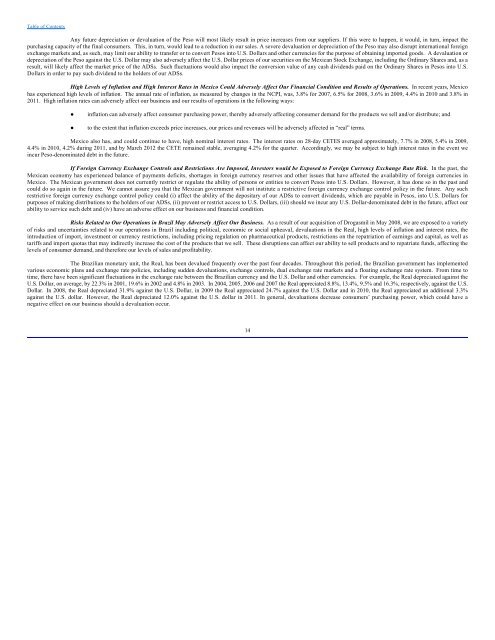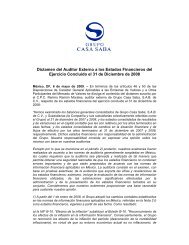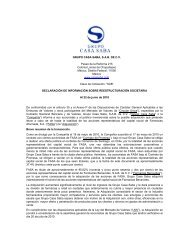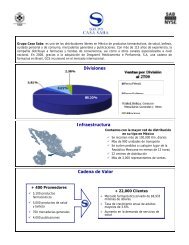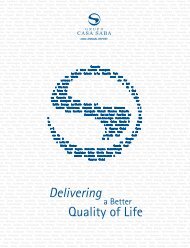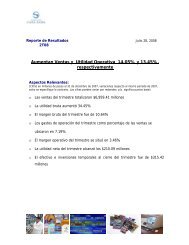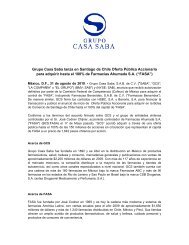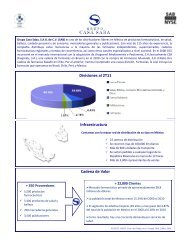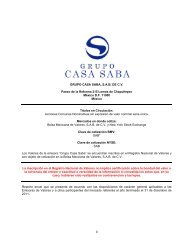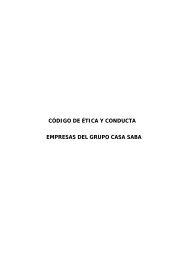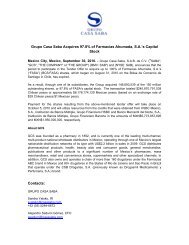FORM 20-F Grupo Casa Saba, S.A.B. de C.V.
FORM 20-F Grupo Casa Saba, S.A.B. de C.V.
FORM 20-F Grupo Casa Saba, S.A.B. de C.V.
Create successful ePaper yourself
Turn your PDF publications into a flip-book with our unique Google optimized e-Paper software.
Table of Contents<br />
Any future <strong>de</strong>preciation or <strong>de</strong>valuation of the Peso will most likely result in price increases from our suppliers. If this were to happen, it would, in turn, impact the<br />
purchasing capacity of the final consumers. This, in turn, would lead to a reduction in our sales. A severe <strong>de</strong>valuation or <strong>de</strong>preciation of the Peso may also disrupt international foreign<br />
exchange markets and, as such, may limit our ability to transfer or to convert Pesos into U.S. Dollars and other currencies for the purpose of obtaining imported goods. A <strong>de</strong>valuation or<br />
<strong>de</strong>preciation of the Peso against the U.S. Dollar may also adversely affect the U.S. Dollar prices of our securities on the Mexican Stock Exchange, including the Ordinary Shares and, as a<br />
result, will likely affect the market price of the ADSs. Such fluctuations would also impact the conversion value of any cash divi<strong>de</strong>nds paid on the Ordinary Shares in Pesos into U.S.<br />
Dollars in or<strong>de</strong>r to pay such divi<strong>de</strong>nd to the hol<strong>de</strong>rs of our ADSs.<br />
High Levels of Inflation and High Interest Rates in Mexico Could Adversely Affect Our Financial Condition and Results of Operations. In recent years, Mexico<br />
has experienced high levels of inflation. The annual rate of inflation, as measured by changes in the NCPI, was, 3.8% for <strong>20</strong>07, 6.5% for <strong>20</strong>08, 3.6% in <strong>20</strong>09, 4.4% in <strong>20</strong>10 and 3.8% in<br />
<strong>20</strong>11. High inflation rates can adversely affect our business and our results of operations in the following ways:<br />
●<br />
●<br />
inflation can adversely affect consumer purchasing power, thereby adversely affecting consumer <strong>de</strong>mand for the products we sell and/or distribute; and<br />
to the extent that inflation exceeds price increases, our prices and revenues will be adversely affected in “real” terms.<br />
Mexico also has, and could continue to have, high nominal interest rates. The interest rates on 28-day CETES averaged approximately, 7.7% in <strong>20</strong>08, 5.4% in <strong>20</strong>09,<br />
4.4% in <strong>20</strong>10, 4.2% during <strong>20</strong>11, and by March <strong>20</strong>12 the CETE remained stable, averaging 4.2% for the quarter. Accordingly, we may be subject to high interest rates in the event we<br />
incur Peso-<strong>de</strong>nominated <strong>de</strong>bt in the future.<br />
If Foreign Currency Exchange Controls and Restrictions Are Imposed, Investors would be Exposed to Foreign Currency Exchange Rate Risk. In the past, the<br />
Mexican economy has experienced balance of payments <strong>de</strong>ficits, shortages in foreign currency reserves and other issues that have affected the availability of foreign currencies in<br />
Mexico. The Mexican government does not currently restrict or regulate the ability of persons or entities to convert Pesos into U.S. Dollars. However, it has done so in the past and<br />
could do so again in the future. We cannot assure you that the Mexican government will not institute a restrictive foreign currency exchange control policy in the future. Any such<br />
restrictive foreign currency exchange control policy could (i) affect the ability of the <strong>de</strong>positary of our ADSs to convert divi<strong>de</strong>nds, which are payable in Pesos, into U.S. Dollars for<br />
purposes of making distributions to the hol<strong>de</strong>rs of our ADSs, (ii) prevent or restrict access to U.S. Dollars, (iii) should we incur any U.S. Dollar-<strong>de</strong>nominated <strong>de</strong>bt in the future, affect our<br />
ability to service such <strong>de</strong>bt and (iv) have an adverse effect on our business and financial condition.<br />
Risks Related to Our Operations in Brazil May Adversely Affect Our Business. As a result of our acquisition of Drogasmil in May <strong>20</strong>08, we are exposed to a variety<br />
of risks and uncertainties related to our operations in Brazil including political, economic or social upheaval, <strong>de</strong>valuations in the Real, high levels of inflation and interest rates, the<br />
introduction of import, investment or currency restrictions, including pricing regulation on pharmaceutical products, restrictions on the repatriation of earnings and capital, as well as<br />
tariffs and import quotas that may indirectly increase the cost of the products that we sell. These disruptions can affect our ability to sell products and to repatriate funds, affecting the<br />
levels of consumer <strong>de</strong>mand, and therefore our levels of sales and profitability.<br />
The Brazilian monetary unit, the Real, has been <strong>de</strong>valued frequently over the past four <strong>de</strong>ca<strong>de</strong>s. Throughout this period, the Brazilian government has implemented<br />
various economic plans and exchange rate policies, including sud<strong>de</strong>n <strong>de</strong>valuations, exchange controls, dual exchange rate markets and a floating exchange rate system. From time to<br />
time, there have been significant fluctuations in the exchange rate between the Brazilian currency and the U.S. Dollar and other currencies. For example, the Real <strong>de</strong>preciated against the<br />
U.S. Dollar, on average, by 22.3% in <strong>20</strong>01, 19.6% in <strong>20</strong>02 and 4.8% in <strong>20</strong>03. In <strong>20</strong>04, <strong>20</strong>05, <strong>20</strong>06 and <strong>20</strong>07 the Real appreciated 8.8%, 13.4%, 9.5% and 16.3%, respectively, against the U.S.<br />
Dollar. In <strong>20</strong>08, the Real <strong>de</strong>preciated 31.9% against the U.S. Dollar, in <strong>20</strong>09 the Real appreciated 24.7% against the U.S. Dollar and in <strong>20</strong>10, the Real appreciated an additional 3.3%<br />
against the U.S. dollar. However, the Real <strong>de</strong>preciated 12.0% against the U.S. dollar in <strong>20</strong>11. In general, <strong>de</strong>valuations <strong>de</strong>crease consumers’ purchasing power, which could have a<br />
negative effect on our business should a <strong>de</strong>valuation occur.<br />
14


